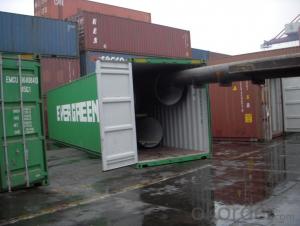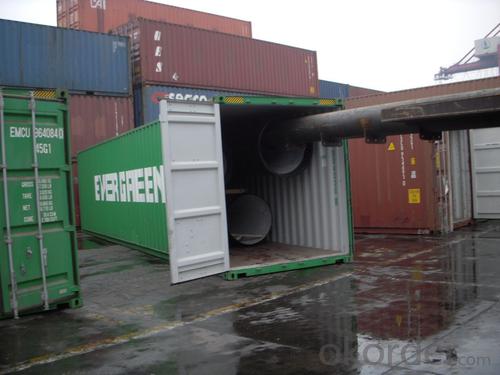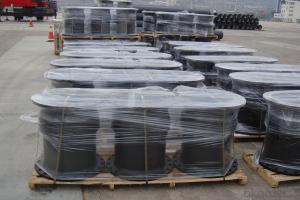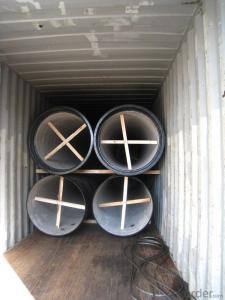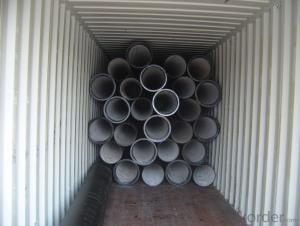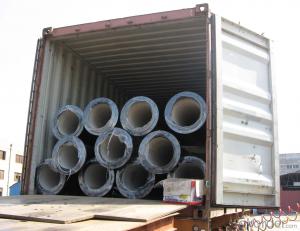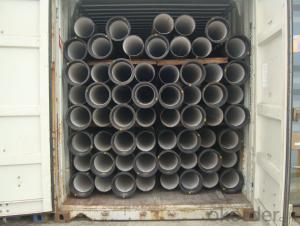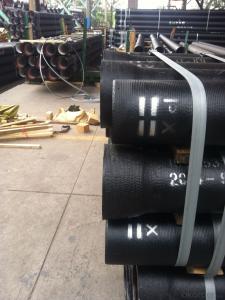DUCTILE IRON PIPES AND PIPE FITTINGS K8 CLASS DN1500
- Loading Port:
- Tianjin
- Payment Terms:
- TT OR LC
- Min Order Qty:
- 22 pc
- Supply Capability:
- 3000 pc/month
OKorder Service Pledge
OKorder Financial Service
You Might Also Like
Material : Ductile Cast Iron
Size Range : DN 80mm to DN 2000mm
Unit Effective Length : 6m or 5.7m
Manufacture Standard: ISO 2531:1998/ EN 545:2006/EN 598:2007
Annual capacity : 200,000 tons
Coating Exterior: Zinc 130g/m2 according to ISO 8179-1 and bitumen coating 70 microns.
Cement Interior: Portland Cement/ High Alumina Cement/ Sulphate Resisting Cement Lining according to ISO 4179
Special requirements on external coating and internal lining can be applied
We also provide accessories such as SBR/EPDM rubber gaskets, lubricant paste, pipe caps, PE sleeves, etc.
Additional Parts:
Each pipe is strictly inspected according to related standard to ensure permanently high performance.
Easy Installation at site and service free for life
Long Service Lifespan
Quotation will arrive you within 24hours once we get your inquiry.
We guarantee offering you a competitive price.
A copy of original inspection reports of pipes will be offered after shipment.
Photos of loading process will be sent to the customer after shipment effect.
We will follow-up the delivery progress after shipment effect and update to the customer on weekly basis.
- Q: Can ductile iron pipes be used for oil and gas pipelines?
- Ductile iron pipes can indeed be utilized for oil and gas pipelines. This robust and long-lasting material possesses corrosion resistance, rendering it ideal for the transportation of oil and gas across extensive distances. Moreover, ductile iron pipes display exceptional pressure-bearing capabilities, enabling them to endure the high pressures commonly associated with oil and gas transportation. Additionally, the installation and maintenance of ductile iron pipes are relatively straightforward, further enhancing their suitability for oil and gas pipelines. Nevertheless, it is crucial to acknowledge that the specific application and conditions of the pipeline necessitate careful consideration. Therefore, seeking advice from industry experts is strongly recommended to ensure the appropriate selection and installation of ductile iron pipes for oil and gas transportation.
- Q: Can ductile iron pipes be used for slurry transportation?
- Yes, ductile iron pipes can be used for slurry transportation. Ductile iron pipes are known for their high strength and durability, making them suitable for various applications including slurry transportation. Slurry is a mixture of solid particles and a liquid, which can be abrasive and corrosive. Ductile iron pipes have excellent resistance to abrasion, corrosion, and erosion, making them capable of handling the challenges posed by slurry transportation. Additionally, ductile iron pipes offer a smooth inner surface, reducing friction and improving the flow of slurry. Therefore, ductile iron pipes are a reliable choice for slurry transportation systems in industries such as mining, wastewater treatment, and oil and gas.
- Q: Can ductile iron pipes be used for drainage systems in airports?
- Ductile iron pipes are an excellent choice for drainage systems in airports. These pipes are well-known for their durability, strength, and ability to resist corrosion, making them suitable for a variety of applications, including drainage systems. They can handle heavy loads, which is crucial in airports where aircraft and vehicles are constantly moving. Moreover, ductile iron pipes are flexible, making installation and modification easy when needed. Additionally, they have a long lifespan, reducing the need for frequent maintenance or replacement. Therefore, ductile iron pipes are a reliable option for airport drainage systems, ensuring efficient water flow and preventing water accumulation to maintain safe and operational facilities.
- Q: What is the expected cyclic fatigue life of ductile iron pipes?
- The expected cyclic fatigue life of ductile iron pipes can vary depending on several factors such as material composition, pipe design, loading conditions, and environmental factors. However, ductile iron pipes are generally known for their excellent fatigue resistance. Ductile iron pipes are designed to withstand cyclic loading, which is commonly experienced in water distribution and sewer systems due to fluctuating pressures and vibrations. These pipes have a unique microstructure that provides high strength and ductility, allowing them to resist the formation and growth of cracks under cyclic loading. Several studies and industry standards have provided estimates for the expected cyclic fatigue life of ductile iron pipes. The American Water Works Association (AWWA) C151 standard, for example, recommends a design life of 100 years for ductile iron pipes used in water distribution systems, indicating their long-term durability and fatigue resistance. Furthermore, research studies have shown that ductile iron pipes can withstand over 1 million cycles of loading without any signs of fatigue failure. The fatigue strength of ductile iron pipes can be further enhanced by using protective coatings or linings to minimize the effects of corrosion and abrasion. However, it is important to note that the expected cyclic fatigue life of ductile iron pipes can be influenced by various factors such as the quality of manufacturing, installation practices, and maintenance procedures. Regular inspections, proper handling, and adherence to recommended installation guidelines can help ensure the longevity and performance of ductile iron pipes. In summary, while the expected cyclic fatigue life of ductile iron pipes can vary depending on several factors, these pipes are generally known for their excellent fatigue resistance and can provide a long-term and reliable solution for water distribution and sewer systems.
- Q: Can ductile iron pipes be used for underground drainage systems?
- Yes, ductile iron pipes can be used for underground drainage systems. Ductile iron pipes have high tensile strength and durability, making them suitable for withstanding the external pressures and loads associated with underground applications. They are also resistant to corrosion and have a long lifespan, making them a reliable choice for drainage systems.
- Q: How does the white iron appear in the case of ductile iron?
- The addition of 0.2% SiC in the raw iron water can effectively reduce the chill.
- Q: What are the common causes of failure in ductile iron pipes?
- There are several common causes of failure in ductile iron pipes. One major cause is corrosion. Over time, the exposure to water, soil, and other environmental factors can lead to the formation of rust and corrosion on the pipe's surface. This can weaken the structural integrity of the pipe and eventually lead to failure. Another common cause is improper installation or handling. If the pipes are not installed correctly or if they are mishandled during transportation or installation, it can result in cracks, fractures, or other physical damage. These defects can compromise the functionality of the pipe and contribute to its failure. Inadequate design is another factor that can lead to failure. If the pipe is not designed to withstand the anticipated loads, pressures, or environmental conditions, it can become susceptible to premature failure. The pipe's material properties, wall thickness, and diameter must be carefully considered during the design process to ensure it can handle the expected demands. Poor maintenance and lack of timely repairs can also contribute to failure. Regular inspections, maintenance, and prompt repairs are necessary to identify and address any issues before they escalate. Failure to do so can result in the gradual deterioration of the pipe, making it more prone to failure. Lastly, external factors such as soil movement, seismic activity, or excessive traffic loads can also cause failure in ductile iron pipes. These external forces can exert stress on the pipe, leading to cracks, fractures, or even complete failure. To prevent failure in ductile iron pipes, it is essential to employ proper corrosion protection techniques, follow correct installation procedures, ensure adequate design considerations, implement regular maintenance and repair programs, and account for external factors during the planning and installation process.
- Q: How does ductile iron pipe compare to PVC pipe in terms of performance and cost?
- Ductile iron pipe and PVC pipe have different characteristics in terms of performance and cost. Ductile iron pipe is known for its strength, durability, and ability to withstand high pressure and heavy loads, making it ideal for applications that require robust performance such as water distribution systems. On the other hand, PVC pipe is lightweight, corrosion-resistant, and more flexible, making it suitable for above-ground and non-pressurized applications like drainage systems. In terms of cost, PVC pipe is generally less expensive than ductile iron pipe, especially for smaller diameter pipes. However, as the diameter increases, ductile iron pipe becomes more cost-effective due to its superior strength and longer lifespan, which reduces maintenance and replacement costs over time. Ultimately, the choice between ductile iron and PVC pipe depends on the specific application, budget, and desired performance characteristics.
- Q: Can ductile iron pipes be used for underground sewage systems?
- Underground sewage systems can utilize ductile iron pipes, which offer numerous advantages. Ductile iron is a form of cast iron that possesses improved flexibility and strength, making it suitable for a variety of applications, including sewage systems. The first advantage of ductile iron pipes for underground sewage systems is their exceptional resistance to corrosion. This is particularly important in sewage systems where moisture and chemicals can contribute to corrosion over time. By resisting corrosion, these pipes ensure long-term durability and reliability. Additionally, ductile iron pipes possess high tensile strength, enabling them to withstand the pressure and stress that occur in underground sewage systems. They are also capable of withstanding ground movements, such as soil settling or shifting, which can cause damage to pipes made from other materials. Moreover, ductile iron pipes have a smooth internal surface, resulting in improved flow capacity and reducing the likelihood of clogging or blockages in the sewage system. This smooth surface also minimizes the accumulation of debris and sediment, lessening the need for frequent maintenance and cleaning. Another significant aspect is that ductile iron pipes are available in various sizes and can be easily connected using a range of joint systems. This allows for flexibility when designing and constructing underground sewage systems. In conclusion, ductile iron pipes are an excellent choice for underground sewage systems due to their corrosion resistance, high tensile strength, smooth internal surface, and ease of installation.
- Q: How does ductile iron pipe perform in extreme weather conditions?
- Ductile iron pipes are known for their exceptional performance in extreme weather conditions. These pipes exhibit a high level of durability, resistance, and flexibility, making them suitable for withstanding harsh weather conditions such as extreme temperatures, heavy rain, snow, and even earthquakes. One of the key attributes of ductile iron is its ability to resist damage from freezing temperatures. Unlike other materials, ductile iron pipes have a low coefficient of thermal expansion, enabling them to withstand the expansion and contraction that occurs during freeze-thaw cycles without cracking or breaking. This ensures the pipes remain intact and continue to perform optimally even in frigid conditions. Additionally, ductile iron pipes have excellent corrosion resistance, making them highly resilient against the corrosive effects of extreme weather. They are protected by a durable zinc coating, which acts as a barrier against rust and other forms of corrosion. This coating, combined with the inherent strength of ductile iron, makes these pipes highly resistant to the corrosive effects of rain, snow, and moisture. Moreover, ductile iron pipes possess superior flexibility, allowing them to accommodate ground movement and seismic activity. In regions prone to earthquakes or shifting soil, these pipes can absorb the stress and strain without fracturing, ensuring continuous water supply and sewerage services even in the most challenging weather conditions. Overall, ductile iron pipes excel in extreme weather conditions due to their durability, resistance to freezing, corrosion, and flexibility. Their ability to withstand the elements ensures uninterrupted water supply and sewage systems, providing reliability and peace of mind to utilities and communities even in the harshest environments.
Send your message to us
DUCTILE IRON PIPES AND PIPE FITTINGS K8 CLASS DN1500
- Loading Port:
- Tianjin
- Payment Terms:
- TT OR LC
- Min Order Qty:
- 22 pc
- Supply Capability:
- 3000 pc/month
OKorder Service Pledge
OKorder Financial Service
Similar products
Hot products
Hot Searches
Related keywords
